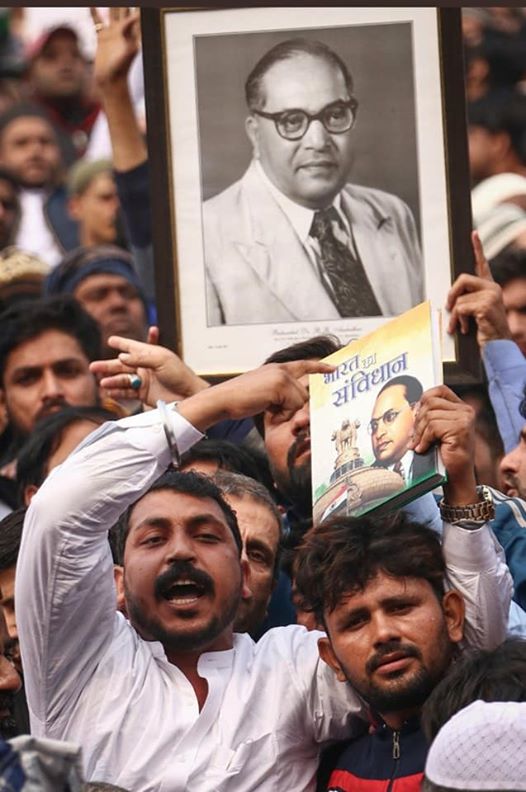Dear Friend,
Chandrasekhar Azad Ravan was arrested late last night. Before that he gave a historic speech on the steps of Delhi Jama Masjid. It must be read by all.
Kindly support honest journalism to survive. https://countercurrents.org/subscription/
If you think the contents of this news letter are critical for the dignified living and survival of humanity and other species on earth, please forward it to your friends and spread the word. It's time for humanity to come together as one family! You can subscribe to our news letter here http://www.countercurrents.org/news-letter/.
In Solidarity
Binu Mathew
Editor
Countercurrents.org
I Will Give My Blood:Chandrasekhar Azad
by Chandrasekhar Azad Ravan
Historic speech given by Chandrasekhar Azad on the steps of Delhi Jama Masjid

Historic speech given by Chandrasekhar Azad on the steps of Delhi Jama Masjid
“Jai Bhim! This is a bigger fight. CAA and NRC will break this country and we are standing with this nation. This fight is not just of the Muslims, this is a fight for everyone, and we will not let it weaken. I’m surrendering to the government, but I say this, the government will have to repeal this Act. I request my friends and comrades, don’t let this revolution weaken, make it grow. Because we are the biggest democracy in the world and that should never weaken.
Our unity is our strength. Protest peacefully, do not give them an opportunity to use their guns and lathis. With non-violence, we will be able to defeat the enemy. I firmly say this to my fellow Indians, come out onto the streets, this is not just a matter of religion or faith, it is a matter of the entire nation.
There seems to be a conspiracy to destroy our country. There seem to be preparations to take away the rights of Dalits, Adivasis and the oppressed, the meaning of their votes, reservation, government benefits, savings. I understood their game, I was fighting but… He who’s sitting there, Amit Shah, I want to tell him that if he wants Chandrasekhar at any cost, then I will go to him myself. But remember this, Ambedkarites do not back down. I’m Babasaheb’s son, I will give my life but I will not go back on my word that if the sweat of our Muslim brothers fall, I will give my blood. For that I’m ready to sacrifice anything. Thank you my friends. Keep this revolution alive after I go to jail. Jai Bhim!”
Chandrasekhar Azad Ravan is Bhim Army chief
Modi’s veiled attack on dress as identity reveals his stark bigotry
by Ananda Maitreya
By alluding to the clothes/dresses of certain protesters, India’s Prime Minister sunk to a new low (or could he?) in his bigotry and petty-mindedness. No one was fooled regarding his reference to the clothes and clothes-wearers he pointed to. The incidents – and the fire/violence – that he was hinting at had begun at Jamia Millia Islamia University in Delhi, and yes, many of the marchers and protesters were Muslims. But to zero-in only on Muslims, to equate the Jamia protests only as Muslim protests is to demonstrate a very blinkered view of things.
India: Swelling Waves of Mass Protests: Reject NAA / NRC /NPR!
by Sukla Sen
No less than the UN Chief himself has put on record his concern over the “fundamentally discriminatory” nature of the Act concerned and the violence and
state repression that followed
Protest Against CAA Held In The Hague
by Press Release
In solidarity with the protests against the Citizenship (Amendment) Act, 2019
When it comes to Our Morality, the Past is Always Easier than the Present
by Romi Mahajan
In India, self-proclaimed “patriots” rightly shudder when they think of the draconian laws and murderous behavior of the British, as they ruled India, robbed the people of their wealth, and presided over death and penury at a scale the world had not seen before; they celebrate however when these very laws and behavior are enacted by their current Government over groups of people who they consider untermenschen. “It is different this time around,” is the refrain. The song, however, remains the same.

Decisions about what actions we might have taken in the past appear straightforward. Would we have fought Nazism in its infancy or gone along with the discrimination, mayhem, and violence? Would we have supported civil rights marchers and freedom riders, ignored them or asked them for gradualism? Would we have fought for women’s suffrage or suggest they remain second class citizens?? Would we have supported a 40-hour work week or allowed industrialists to willfully abuse employees? Would we have demanded that Union Carbide spend the money to fix the plant in Bhopal or worry about the “chilling effect” that might have on foreign investment?
We are all righteous in our imaginations. We would not have been lined up in the streets and offered flowers in adoration to Hitler; no, we’d have protected Jews –and others- and fought for their rights while publicly denouncing Nazism. And so on.
Just as we confer Sainthood on the courageous of the past, we find our own morality in the past as well. We do so partially so we don’t have to enact it in the present. It’s easier to be comfortable than openly and actively moral. Even for otherwise good people, silence is easier than noise.
But noise we need. And the present we must manage if we are to have a decent future.
In India, self-proclaimed “patriots” rightly shudder when they think of the draconian laws and murderous behavior of the British, as they ruled India, robbed the people of their wealth, and presided over death and penury at a scale the world had not seen before; they celebrate however when these very laws and behavior are enacted by their current Government over groups of people who they consider untermenschen. “It is different this time around,” is the refrain. The song, however, remains the same.
Others feel uncomfortable at the events unfolding but satisfy themselves with soothing thoughts about the “pendulum swinging back.” Here, one must not look at History purely as a series of atomic events in different points of time. The causal forces in History are not understood or accounted for in a purely phenomenological fashion. Not always in history did the pendulum indeed swing back in time but even when it did, it did so as the result of action, protest, insurrection, and revolution. It did not come back on its own- it never does.
Some good Germans watched as their Republic eroded, piece by piece, and kept thinking that the pendulum would swing back. What we got in this process was Nazism and World-War Two. Many otherwise well-meaning white Americans asked civil rights organizations to slow down, to embrace a benign gradualism. As we’ve been reminded, they asked African –Americans to put a timeline on their own freedom and dignity. What we got from this abdication was lynchings, redlines and assassinations.
As we sit back and wonder, in awe, how ordinary people could let demagoguery metastasize into violence, mayhem, and mind-bending destruction so many times in history, we avoid the mirror. The mirror yields our image in the present.
So we have a choice about the world we will have. We have a choice about what generations hence will think of us. We have a choice to stop using the ease of invoking the past to sully the present and the future.
Indeed, it is not different this time.
Romi Mahajan in an Author, Marketer, Investor, and Activist
Medical Opinion, Torture and
Julian Assange
by Dr Binoy Kampmark
On November 27 this year, UN Special Rapporteur on Torture, Nils Melzer, delivered an address to the German Bundestag outlining his approach to understanding the mental health of WikiLeaks founder Julian Assange. These comprised two parts, the initial stage covering his diplomatic asylum in the Ecuadorean embassy, the second dealing with his formal detention in the United Kingdom at the hands of the UK legal and judicial system. The conclusion was a recapitulation of previous findings: that Assange has been subjected to a prolonged, state-sponsored effort in torture, nothing less than a targeting of his being.

On November 27 this year, UN Special Rapporteur on Torture, Nils Melzer, delivered an address to the German Bundestag outlining his approach to understanding the mental health of WikiLeaks founder Julian Assange. These comprised two parts, the initial stage covering his diplomatic asylum in the Ecuadorean embassy, the second dealing with his formal detention in the United Kingdom at the hands of the UK legal and judicial system. The conclusion was a recapitulation of previous findings: that Assange has been subjected to a prolonged, state-sponsored effort in torture, nothing less than a targeting of his being.
Melzer’s address is an expansive portrait of incremental inter-state torment that led to Assange’s confinement “in a highly controlled environment within the Ecuadorean embassy for more than six years.” There was the eventually justified fear that he would be sought by the United States in extradition proceedings. The Swedish authorities threw in their muddled lot between 2010 and 2019, attempting to nab Assange for rape claims despite “not being able to produce enough evidence for an indictment, and which now, after almost a decade, has been silently closed for the third time based on precisely that recognition.”
Then came the British contribution, consisting of encouragement to the Swedes by the Crown Prosecution Service that the investigation should not be closed, inspiring them not to get “cold feet”. (The cold feet eventually came.) The Ecuadorean contribution completed the four-piece set, with the coming to power of a pro-Washington Lenín Moreno. Embassy personnel in London were encouraged to make conditions that less pleasant; surveillance operations were conducted on Assange’s guests and meetings.
Melzer, along with a medical team, attended to Assange on May 9, 2019 in Belmarsh, finding a man with “all the symptoms that are typical of persons having been exposed to psychological torture for a prolonged period of time.” There was little doubt, in Melzer’s mind, that symptoms “already measurable physically, neurologically and cognitively”, had been shown.
These calls went unheeded. Melzer, in early November, accused the UK authorities of showing “outright contempt for Mr Assange’s rights and integrity.” Despite warnings issued by the rapporteur, “the UK has not undertaken any measures of investigation, prevention and redress required under international law.” Melzer’s prognosis was bleak. “Unless the UK urgently changes course and alleviates his inhumane situation, Mr Assange’s continued exposure to arbitrariness and abuse may soon end up costing his life.”
This point has been restated by Dr. Stephen Frost, a chief figure of the dedicated outfit calling itself Doctors for Assange. “We repeat that it is impossible to assess adequately let alone treat Mr Assange in Belmarsh prison and that he must as a matter of urgency be moved to a university teaching hospital. When will the UK government listen to us?”
The medical degrading of Assange has assumed ever greater importance, suggesting unwavering state complicity. On November 22, over 65 notable medical doctors sent the UK Home Secretary a note based on Melzer’s November 1 findings and Assange’s state at the October 21 case management hearing at Westminster Magistrates Court. “It is our opinion that Mr Assange requires urgent expert medical assessment of both his physical and psychological state of health. Any medical treatment indicated should be administered in a properly equipped and expertly staffed university teaching hospital (tertiary care).”
In a second open letter to the UK Lord Chancellor and Secretary of State for Justice dated December 4, the Doctors for Assange collective warned that the UK’s “refusal to take the required measures to protect Mr Assange’s rights, health and dignity appears [to] be reckless at best and deliberate at worst and, in both cases, unlawfully and unnecessarily exposes Mr Assange to potentially irreversible risks.”
The same grounds were reiterated in a December 16 letter to Australian Foreign Minister Marise Payne, with a curt reminder that she had “an undeniable legal obligation to protect your citizen against the abuse of his fundamental rights, stemming from US efforts to extradite Mr Assange for journalism and publishing that exposed US war crimes.” In the event that Payne took no action on the matter, “people would want to know what you […] did to prevent his death.”
In the addendum to the open letter, further to reiterating the precarious state of Assange’s health and medical status as a torture victim, the doctors elaborate on the circular cruelty facing the publisher. An individual deemed “a victim of psychological torture cannot be adequately medically treated while continuing to be held under the very conditions constituting psychological torture, as is currently the case for Julian Assange.” Appropriate medical treatment was hardly possible through a prison hospital ward.
A lesson in understanding mental torture is also proffered. “Contrary to popular misconception, the injuries caused by psychological torture are real and extremely serious. The term psychological torture is not a synonym for mere hardship, suffering or distress.”
At Assange’s case management hearing on December 19, restrictions on medical opinion were again implemented; psychiatrist Marco Chiesa and psychologist David Morgan were prevented from attending. Both had been signatories to the spray of open letters. According to Morgan, he had hoped to “provide some observations about Julian Assange’s health, psychologically, and with my colleagues, physically.” Instead, it transpired that access was denied, according to psychologist Lissa Johnson, “despite members of the public offering to give up seats for them.”
Cold-shouldering expert opinion can be counted as one of the weapons of the state in punishing whistleblowers and publishers. The State has always made it a bureaucratic imperative to sift the undesirable evidence from the apologetic message. Accepting Assange’s condition would be tantamount to admission on the part of UK authorities, urged on by the United States, that intolerable, potentially martyring treatment, has been meted out to a publisher.
Dr. Binoy Kampmark was a Commonwealth Scholar at Selwyn College, Cambridge. He lectures at RMIT University, Melbourne. Email: bkampmark@gmail.com
No comments:
Post a Comment